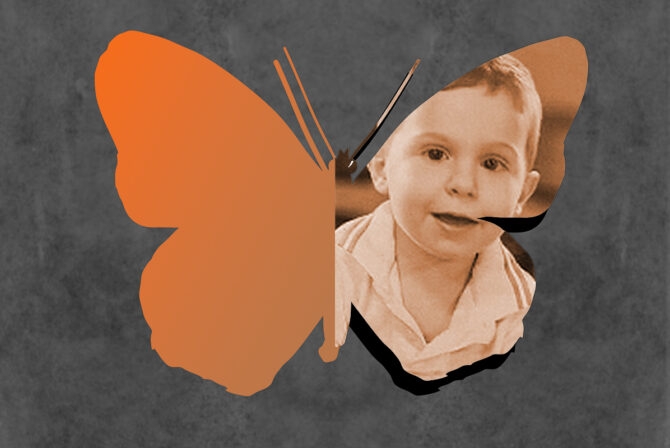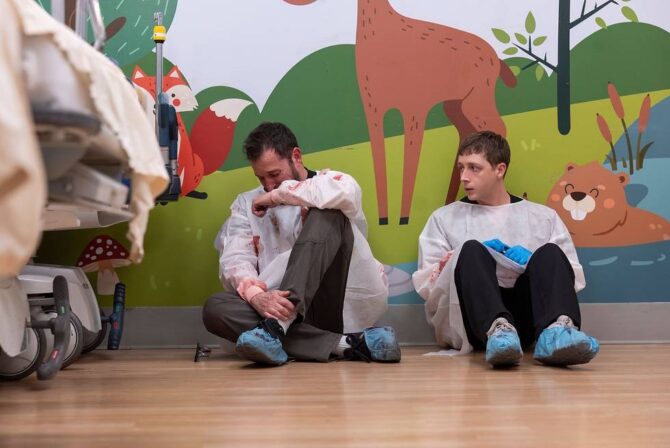I wasn’t married very long–barely two and a half years. So short that I was featured in a book called Starter Marriages. My ex was a nice man, just wrong for me (and me for him), and we went our separate ways 12 years ago. Our union was dissolved, just like that.
Or was it?
Fast-forward to 2008, and I was about to allow hope to trump experience, and get remarried. Randy and I adored the Jew-mmunity of the shul we joined together. I loved that it was about as traditional as a Reform synagogue can get. And he loved how our rabbi provided ample opportunity for discussion of both religion and baseball.
The Legal Document
But when we took a little Judaism refresher course, I found there were some things about Jewish marriage that I hadn’t realized. One: America’s pretty unusual with the whole separation-of-church-and-state thing. Two: In Israel, that pretty little ketubah I signed in 1996 is actually a legal and binding document. Three: I might be a divorcee here in the States, but according to the laws of Israel, I was still legally bound to a philosophy professor living in…um, let’s see…google, google, google…Houston. Oops.
“Come on, does that really matter?” I asked my groovy, understanding, sure-to-be-cool-about-this rabbi.

I just couldn’t doom my future kids
to not be able to marry a Jew.
“Um … yes,” he said, pointing out that my future progeny could have some serious trouble if they moved to Israel and wanted to get all frummy with it. Okay, so the chances are slim, but I don’t like the idea of my mistake hampering my kids. And the same way that something ancient and traditional can bring me into the warm glow of community, so it can also make me feel a little uneasy when I realize that tradition also requires something of me.
An online pal put it more bluntly: “Technically, they’d be ‘momzers [bastards].’ It’s bad juju.”
Gonna Get a Get
So I decided to get a get. All I knew about the Jewish decree of divorce was what I had heard in a flurry of human-interest stories from the mid-‘90s, about abused women in the ultra-Orthodox community being refused gets by husbands who didn’t want them to move on, abetted by sexist rabbis.
This was galling to me. Especially since neither my remarried ex-husband, nor my fiancé, were required to obtain a get–this one’s strictly for the ladies. And it costs money! What kind of a feminist could I be if I succumbed to this ancient demand for fealty?
On the other hand, unfinished business bothered me. It wasn’t the tradition’s fault that some jerky rabbis had co-opted it to mistreat people. In fact, that made me want to reclaim this tradition for everyone. Besides, I wanted a Jewish home. I wanted a ketubah. I wanted to give back to a religion that had brought me through so much. I wanted to show that I wasn’t just in it for the movies, food, music, and comedy. Not just in it for the parties and holidays. Not just in it for what I picked and chose and found appealing. I was all in: Jewish, Jewish, Jewish. Even when it’s not so convenient.
I contacted an organization called Kayama, in Crown Heights, Brooklyn (natch). They were modern Orthodox, they were here to help, and they just wanted to get things squared away for me. I clung to the phone when they called, listening to their accent and missing the sights and sounds of my old burg. Yes, yes, I would do this.
How It Happened
The first order of business was to contact my ex. He thought I was a religious nut in the first place, for my crazy notions like “we should go to synagogue on the High Holidays” and “maybe it would be nice to get married by a rabbi.” (See? Bad match.) If I was going to have a guy in a black hat arrive on his doorstep, I at least needed to warn him. He politely acquiesced–which was more than I deserved, frankly after the hasty and heartbreaking escape-act I pulled to end our marriage– and Kayama started its cross-country trek to make an honest Jewish woman out of me.

A typical ketubah (Jewish marriage document)
This is where my memory started to fail me (hey, I’ve had two kids since then), so I checked back in with Kayama’s director, Dr. Isaac Skolnik. The cost of the get was $750, but when you consider what went into it, that sounds like a bargain.
“We’re not rabbis,” Skolnik told me. “We’re middlemen. We don’t arrange the get, we arrange the arranging. We have a database of people who can arrange a get no matter where Jews end up.” In my case, there was nobody in Houston to do the deed. However, there is a rabbi in Memphis, a Rabbi Greenblatt, who’s qualified to arrange a get and whose “territory” includes Texas, the Western United States, and South America. He arranged to meet with Josh on his next trip through Texas.
I had to confirm that both moms–mine and my ex’s–were Jewish , which wasn’t hard—they took my word for it. Then Rabbi Greenblatt arranged for two local witnesses to perform a short ritual with Josh.
“The process is always the same,” Skolnik told me. “It’s a standard document that needs to be written from scratch. Every one of them has to be written from beginning to end, 12 lines with a quill pen and a bottle of ink and the first names of the people involved–English and Hebrew.” Technically, he was supposed to write and deliver this himself, but since he’s not a scribe, he was given a short script to authorize Greenblatt to be his proxy.
Ending My Marriage… Again
When Greenblatt next came through California, he passed the document along to a Chabad rabbi in Palo Alto, who then arranged to meet me at a kosher deli near my office. He said he’d have some students with him, and boy, did he. The rabbi himself was as welcoming and warm as I remembered from the Orthodox community in Brooklyn, where I had worked at the in-flight magazine for Tower Air Magazine and still had frum friends. I carefully greeted him with my hands at my side, but he reached out and shook my hand, and explained the process we’d be going through. The students, barely out of high school it seemed, looked at me like I was some kind of experiment, and only addressed the rabbi, not me. I felt all my rebellion well up in me–I had the sudden wicked urge to run up and poke them with tampons, yelling “Unclean! Unclean!”
I restrained myself; these were, after all, my kosher witnesses. The kind, older rabbi ran me through what I’d have to do: We’d go over the names in the document. I would take off my rings (so there would be nothing between my hands and the document). I would stand and read a declaration that said yes, I accepted this get. He would fold it in (doubled, and then in thirds), and I would hold my hands cupped in front of me. He’d drop it into my willing hands, and I would turn and take a few ceremonial steps away.
It happened just as he said, in a public plaza outside a deli overlooking the San Francisco Bay on a warm-ish, sunny day. I found that my hands trembled, and I felt formal and self-conscious. I didn’t think of my ex-husband or feel sad about the long-ago marriage I was, finally, dissolving. It was all so removed from the actual events of my life. I just concentrated on the physical aspects of what I was doing, feeling like the spiritual workings were doing their thing somewhere else.
I turned, took the ceremonial steps away, my formal shoes squeaking on the stones. That was it. No sizzle of freedom, no butterflies, no lifting of a cloud. It was just done.
I thanked the rabbi, asking a million questions about why the paper was folded that way, what happened next, and why, why, why. Like with everything else in my life, I treated this as research, a way to step back from the experience and observe it rather than feeling it. Then I went back to my office, not telling anyone what I had just done.
Now What?
A few weeks later, it arrived in the mail, all nice and finalized. “Do you want to see it?” I asked my rabbi.” “Nah,” he told me. “That’d be a pretty weird thing to lie about.” When he married us a few months later, I signed our gorgeous new ketubah secure in the knowledge that if anyone was watching, I was A-OK with Yahweh.
“Technically, a Reform rabbi wouldn’t require this,” Skolnik pointed out during our conversation. But as a ritual that brings all the denominations together, it’s still important. “This is so that we can all sit around the same table together, and my children can marry yours.”
And no, I didn’t tell my mom I did this. She would have thought it was the dumbest thing ever. But it mattered to me to do things according to the rules, like when I keep kosher for Passover (once a year) or that semester in college when I wouldn’t eat milk and meat together. It was me saying, “Okay, Judaism. Thanks for the holidays, the community, the matzah balls. Here’s something back.”
But Judaism? Next time, let’s make it something slightly less complicated.







